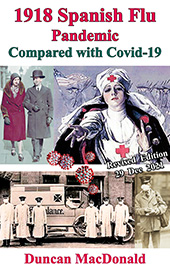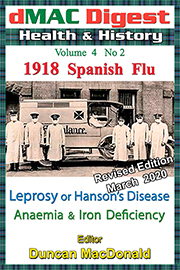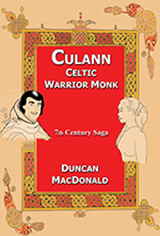Duncan MacDonald
Jakarta 5 January 2013
The festive season is here (again) and despite last year's resolutions, we may just imbibe a wee drop too much (again). Let's look at the causes and possible cures
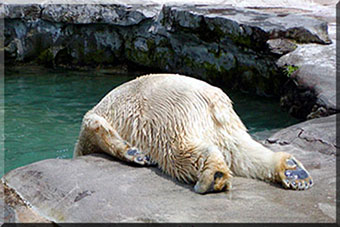 The Symptoms - As if you don't know already. The symptoms depend on severity and may include sweating, flushing, talking too much, showing off, impaired judgement, emotional instability, confusion and disorientation, memory loss, uncoordinated movement, headaches, dry mouth, irritability, bloodshot eyes, sensitive to light and noise, nausea and vomiting
The Symptoms - As if you don't know already. The symptoms depend on severity and may include sweating, flushing, talking too much, showing off, impaired judgement, emotional instability, confusion and disorientation, memory loss, uncoordinated movement, headaches, dry mouth, irritability, bloodshot eyes, sensitive to light and noise, nausea and vomiting
The Cause - Hangovers are usually the result of drinking too much alcohol beverage, too quickly. Ethanol has a dehydrating effect (such substances are known as diuretics), which causes headaches, dry mouth and lethargy.
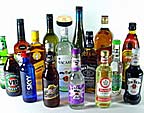
Another factor contributing to hangover is the conversion of alcohol to acetaldehyde by the liver by the enzyme alcohol dehydrogenase. This metabolite is probably more toxic than alcohol
Finally, there are various nervous effects. The removal of the depressive effects on the brain probably account for the light and noise sensitivity. It is also thought that the presence of other alcohols (such as methanol and fusel oils) by-products of the alcoholic fermentation also called congeners, exaggerates many of the symptoms. This probably accounts for the mitigation of the effects when distilled alcohol, particularly vodka, is consumed.
The amount of tannin in the drink may also have an effect. Red wines have more tannin than white wines and some people note less hangover effects with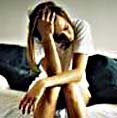 white wine.
white wine.
Some people believe that sugar (often found in sweet cocktails) worsens hangovers; however, this may be because of our susceptibility to imbibe more sweet drinks.
Nicotine poisoning can often worsen hangovers, as smokers tend to smoke much more than usual while under the influence of alcohol.[ 1 ]
Genetics also plays a part. Some people seldom, if ever, suffer hangover symptoms, no matter how much they drink NHS (UK's National Health Service) Recomendation
NHS (UK's National Health Service) Recomendation
Know your units
You may be surprised. A large glass of wine, for instance, contains around three units. In one evening, that can quickly add up to a lot more than you intended to drink. Here are some examples:
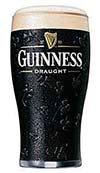
Follow these tips to keep hangovers away
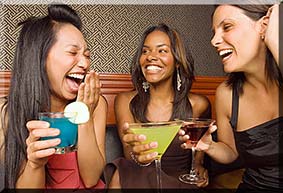
Prevention – the Pre-Party Plan – If you know in advance, you will be drinking alcohol; the following tips will help protect your liver: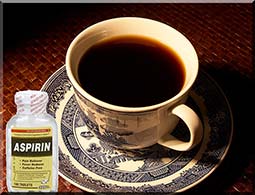
The morning after - If you wake up the next morning feeling terrible, you probably didn't follow this advice. Although there are no real cures for hangovers, there are ways to ease the symptoms.
Treatment involves rehydrating the body so it can deal with the painful symptoms (though the best time to rehydrate is before going to sleep).
Sugary foods may help you tremble less. In some cases, an antacid may be needed to settle your stomach first.
Bouillon soup, a thin vegetable-based broth, is a good source of vitamins and minerals, which can top-up depleted resources. Its main advantage is that it's easy for a fragile stomach to digest.
You can replace lost fluids by drinking bland liquids that are easy on the digestive system, such as water, soda water and isotonic drinks (available in most shops).
If you've had a heavy drinking session, hangover or not, doctors advise that you wait wait 48 hours before drinking any more alcohol. This will give your body tissue time to recover. Sometimes of course, a hangover makes that advice easier to follow.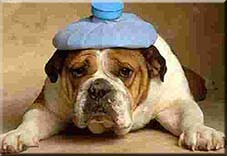
The Cures - Hangover cures are generally urban myth.
There are no cures for a hangover. There are tips for avoiding hangovers and easing the symptoms if you have one.
The best way to avoid a hangover is not to drink alcohol. If you decide to drink, do it sensibly and within the recomended limits.
To minimise the risk of future serious health problems, men shouldn't drink more than three to four units per day. Women shouldn't drink more than two to three units a day.
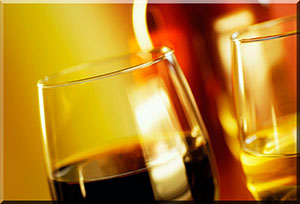 Myths and Facts
Myths and Facts
MYTH: Wine is the Gentlest Choice
FACT: red wine contains tannins, compounds that are known to trigger headaches in some people. Malt liquors, like whiskey, also tend to cause severe hangovers. If you're worroied about how you'll feel in the morning, the gentlest choices are beer and clear liquors, such as vodka and gin.
MYTH: Only Bingers Get Hangovers
FACT: You don'thave to get wasted to pay a price the next morning. Just a couple of drinks can trigger a headache and other hangover symptoms for some people. Having water or a non-alcoholic drink between each beer or hard drink can help keep you hydrated and cut down on the overall amount of alcohol you drink.
MYTH: Hangovers Are Gender Based
FACT: Don't go crazy with free drinks on Ladies' Night. If a man and a woman drink the same amaount, the woman is more likely to feel the effects. That's because a men have a higher percentage of water in their bodies, which helps dilute the alcohol they drink. When women drink the same amount, more alcohol builds up in their bloodstream.
MYTH: Hangovers Are No Big Deal
FACT: Heavy drinking rocks the central nervous system. It tinkers with brain chemicals - leading to headache, dizziness and nausia. It sends you running to the bathroom so often you become dehydrated and with a weakened immune system.
MYTH: Liquor Before Beer
FACT: Its the amount of alcohol you drink (not the order of your drinks) that matters most. Standard drinks - a 12 oz glass of beer, a 5 oz glass of wine, or a 1.5 oz "shot" of distilled spirits - have about the same amount of alcohol. Don't be fooled by the size of your drink, or by any saying about alcohol that includes the phrase "never fear" .
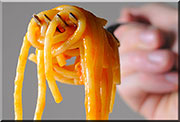
MYTH: Eat Pasta Before Bed
FACT: Wrong on two counts. Fist, eating at bedtime (after you're already drunk) is no help. Food has to be in your stomach long before Happy Hour to have any impact. Second, although any food can slow down how fast your body absorbs alcohol, fat does it best. So go for steak or pizza before your first martini, and you might escape a hangover. One bedtime tip that does help - drink water to fight dehydration.
MYTH: Pop Pain Relievers Before Bed
FACT: Over-the-counter painkillers peak in about four hours, so a bedtime dose won’t help by the time you wake up. A better plan is to take the pills when you first wake up. Don’t take acetaminophen (Tylenol) after a night of drinking. The combination could hurt your liver.
MYTH: Alcohol Helps You Sleep Well
FACT: Just the opposite. While a nightcap may help you doze off more quickly, it undermines the quality of your sleep. You don’t spend as much time in all-important REM cycles and you tend to wake up too soon. If you’ve been drinking heavily, a hangover might strike in the last part of the night, leaving you too uncomfortable to get back to sleep.
MYTH: Hair of the Dog
FACT: More alcohol in the morning does nothing but postpone a hangover. The worst symptoms hit when blood-alcohol levels drop to zero. If you have a Bloody Mary at breakfast, this moment will just come later in the day. And if you find you can’t function without a wake-up cocktail, you should talk with your doctor about getting help for alcohol addiction.
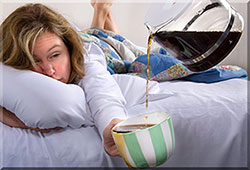
MYTH: Coffee Is the Cure
FACT: A lot of coffee leads to more dehydration and could make your hangover worse. After a night of drunkenness, it’s best to avoid anything with caffeine. Instead, sip water and sports drinks to counter dehydration and replace lost electrolytes -- especially if you throw up.
MYTH: Herbal Remedies Can Help
FACT: British researchers reviewed the studies on hangover pills, such as yeast and artichoke extract. They found no compelling evidence that they worked. Another British team found a supplement made from prickly pear cactus may reduce nausea and dry mouth from hangovers, [see Australia below] but not the dreaded headache. The only proven cure? - Time.
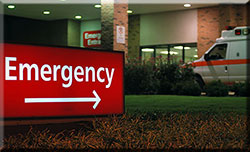 NO MYTH: Alcohol Poisoning
NO MYTH: Alcohol Poisoning
FACT: Alcohol poisoning is a life-threatening emergency. Symptoms include:
Some other cures (that also don't work)
More recently, a 2004 clinical study suggested that taking prickly pear ( Opunita ficus indica ) fruit extract several hours before drinking can significantly reduce certain hangover symptoms, including nausea. The authors theorise that the extract may work by suppressing the body's natural immune reaction to congeners
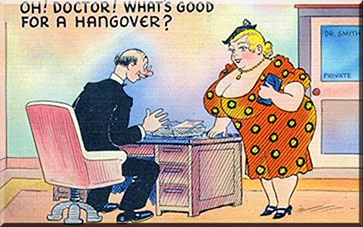 CONCLUSION:
CONCLUSION:
If you know you are going to drink alcohol, try the following steps;
♦ Eat a meal before you start drinking
♦ Alternate between alcoholic and soft drinks
♦ Don't Drive: Alcohol remains in the bloodstream for long periods. You may still be unsafe to drive the day after you have been drinking
♦ Don't drink more alcohol to reduce your symptoms; this will only prolong the hangover
♦ Rest until you begin to feel better. Your best bet is to go back to bed
♦ Don't drink coffee or tea because they irritate the stomach and cause dehydration
♦ Treat a hangover like the flu - Alcohol dehydrates you. Tackle dehydration by doubling your fluid intake, preferably with an electrolyte-enhanced sports drink .
♦ Seek medical advice if;
(i) You have regular hangovers and are finding it hard to reduce your drinking
(ii) You feel the need to drink alcohol first thing in the morning Virus
Index-History
Virus
Index-History
 The Symptoms - As if you don't know already. The symptoms depend on severity and may include sweating, flushing, talking too much, showing off, impaired judgement, emotional instability, confusion and disorientation, memory loss, uncoordinated movement, headaches, dry mouth, irritability, bloodshot eyes, sensitive to light and noise, nausea and vomiting
The Symptoms - As if you don't know already. The symptoms depend on severity and may include sweating, flushing, talking too much, showing off, impaired judgement, emotional instability, confusion and disorientation, memory loss, uncoordinated movement, headaches, dry mouth, irritability, bloodshot eyes, sensitive to light and noise, nausea and vomiting The Cause - Hangovers are usually the result of drinking too much alcohol beverage, too quickly. Ethanol has a dehydrating effect (such substances are known as diuretics), which causes headaches, dry mouth and lethargy.
Alcohol is also a metabolic poison and its impact on the stomach lining probably accounts for the nausea

Another factor contributing to hangover is the conversion of alcohol to acetaldehyde by the liver by the enzyme alcohol dehydrogenase. This metabolite is probably more toxic than alcohol
Finally, there are various nervous effects. The removal of the depressive effects on the brain probably account for the light and noise sensitivity. It is also thought that the presence of other alcohols (such as methanol and fusel oils) by-products of the alcoholic fermentation also called congeners, exaggerates many of the symptoms. This probably accounts for the mitigation of the effects when distilled alcohol, particularly vodka, is consumed.
The amount of tannin in the drink may also have an effect. Red wines have more tannin than white wines and some people note less hangover effects with
 white wine.
white wine.Some people believe that sugar (often found in sweet cocktails) worsens hangovers; however, this may be because of our susceptibility to imbibe more sweet drinks.
Nicotine poisoning can often worsen hangovers, as smokers tend to smoke much more than usual while under the influence of alcohol.[ 1 ]
Genetics also plays a part. Some people seldom, if ever, suffer hangover symptoms, no matter how much they drink
 NHS (UK's National Health Service) Recomendation
NHS (UK's National Health Service) Recomendation
- • Men should not regularly drink more than three to four units of alcohol a day.
- • Women should not regularly drink more than two to three units a day.
- • If you've had a heavy drinking session, avoid alcohol for 48 hours
Know your units
You may be surprised. A large glass of wine, for instance, contains around three units. In one evening, that can quickly add up to a lot more than you intended to drink. Here are some examples:

- • a can of standard larger, beer or bitter = 1.8 units
- • a pint of standard larger, beer or bitter = 2.3 units
- • a small glass of wine (125ml) = 1.5 units
- • a large glass of wine (250ml) = 3 units
- • a measure of spirits (25ml) = 1 unit
Follow these tips to keep hangovers away
- • Don't drink on an empty stomach. Before you go out, have a meal that includes carbohydrates (pasta or rice) or fats. The food will help slow down the body's absorption of alcahol.
- • Don't drink dark coloured drinks if you've found that you're sensitive to them. They contain natural chemicals called congeners (impurities) which irritate blood vessels and tissue in the brain and can make a hangover worse.
- • Drink water or non-fizzy drink. Carbonated (fizzy) drinks speed up the absorption of alcohol into your system.
- • Drink a pint or so of water before you go to sleep. Keep a glass of water by the bed to sip if you wake up during the night.

Prevention – the Pre-Party Plan – If you know in advance, you will be drinking alcohol; the following tips will help protect your liver:
- • One alcoholic drink an hour is all the liver can handle before a toxic backlog builds up in the bloodstream
- • Eat BEFORE you drink. Even a banana will line your stomach and slow down the absorption of alcohol into the bloodstream. If you eat a meal with fat, protein and carbohydrates in it, you will absorb alcohol three times slower than on an empty stomach [ 2 ]
- • Milk thistle an herb (also known as St Mary's thistle) helps strengthen the membranes of the liver cells, protecting them from damage caused by alcohol. It also reduces the destruction of glutathione – a vital detoxing enzyme – which helps increase the speed at which the body can break down toxins such as alcohol. Alcohol-induced hangovers are minimised by taking milk thistle
- • Spritzers Alcohol switches off the hormone that helps the body retain water, resulting in dehydration and headaches. Loss of body water stimulates thirst, which of course encourages more drinking. The best fluid to relieve dehydration is water. So prevent dehydration by drinking water or mineral water in between alcoholic drinks. A popular drink in Europe is white wine mixed with mineral water – called a Spritzer
- • Niacin and Vitamin B The body uses a considerable amount of nutrients when processing alcohol. Niacin (vitamin B3) binds to the alcohol molecule (acetaldehyde) and helps transport it out of the body. If vitamin B3 levels are low, this elimination process will be impaired and
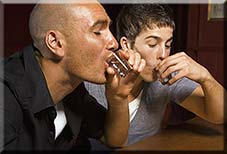 prolong alcohol levels in the bloodstream. By taking a complex vitamin B supplement, daily you will ensure your vitamin B levels are adequate to deal with any increase in alcohol intake.
Foods high in vitamin B include avocado, eggs, milk, cheese, legumes, almonds and walnuts, salmon, tuna and sardines, chicken, lean meat, wheat germ, and green vegetables
prolong alcohol levels in the bloodstream. By taking a complex vitamin B supplement, daily you will ensure your vitamin B levels are adequate to deal with any increase in alcohol intake.
Foods high in vitamin B include avocado, eggs, milk, cheese, legumes, almonds and walnuts, salmon, tuna and sardines, chicken, lean meat, wheat germ, and green vegetables - • Antioxidants help fight cellular damage caused by alcohol consumption. Vitamin C is destroyed by alcohol. So take a vitamin C supplement daily to boost your immune system. Other antioxidants include vitamin A, E, selenium, zinc, beta-carotene, green tea, bilberry, gingko biloba, blackcurrant, broccoli, citrus fruits, guava, parsley, peppers, pineapple, potatoes, raw cabbage, rosehips and strawberries.


The morning after - If you wake up the next morning feeling terrible, you probably didn't follow this advice. Although there are no real cures for hangovers, there are ways to ease the symptoms.
Treatment involves rehydrating the body so it can deal with the painful symptoms (though the best time to rehydrate is before going to sleep).
Over-the-counter painkillers can help with headaches and muscle cramps. Paracetamol based remedies are usually preferable, as asprin may further irritate the stomach and increase nausea and sickness.
Sugary foods may help you tremble less. In some cases, an antacid may be needed to settle your stomach first.
Bouillon soup, a thin vegetable-based broth, is a good source of vitamins and minerals, which can top-up depleted resources. Its main advantage is that it's easy for a fragile stomach to digest.
You can replace lost fluids by drinking bland liquids that are easy on the digestive system, such as water, soda water and isotonic drinks (available in most shops).
If you've had a heavy drinking session, hangover or not, doctors advise that you wait wait 48 hours before drinking any more alcohol. This will give your body tissue time to recover. Sometimes of course, a hangover makes that advice easier to follow.

The Cures - Hangover cures are generally urban myth.
There are no cures for a hangover. There are tips for avoiding hangovers and easing the symptoms if you have one.
The best way to avoid a hangover is not to drink alcohol. If you decide to drink, do it sensibly and within the recomended limits.
To minimise the risk of future serious health problems, men shouldn't drink more than three to four units per day. Women shouldn't drink more than two to three units a day.
To avoid a hangover don't drink more than you know your body can cope with. If you're not sure how much that is, be very careful. |
 Myths and Facts
Myths and Facts
MYTH: Wine is the Gentlest Choice
FACT: red wine contains tannins, compounds that are known to trigger headaches in some people. Malt liquors, like whiskey, also tend to cause severe hangovers. If you're worroied about how you'll feel in the morning, the gentlest choices are beer and clear liquors, such as vodka and gin.
MYTH: Only Bingers Get Hangovers
FACT: You don'thave to get wasted to pay a price the next morning. Just a couple of drinks can trigger a headache and other hangover symptoms for some people. Having water or a non-alcoholic drink between each beer or hard drink can help keep you hydrated and cut down on the overall amount of alcohol you drink.
MYTH: Hangovers Are Gender Based
FACT: Don't go crazy with free drinks on Ladies' Night. If a man and a woman drink the same amaount, the woman is more likely to feel the effects. That's because a men have a higher percentage of water in their bodies, which helps dilute the alcohol they drink. When women drink the same amount, more alcohol builds up in their bloodstream.
MYTH: Hangovers Are No Big Deal
FACT: Heavy drinking rocks the central nervous system. It tinkers with brain chemicals - leading to headache, dizziness and nausia. It sends you running to the bathroom so often you become dehydrated and with a weakened immune system.
MYTH: Liquor Before Beer
FACT: Its the amount of alcohol you drink (not the order of your drinks) that matters most. Standard drinks - a 12 oz glass of beer, a 5 oz glass of wine, or a 1.5 oz "shot" of distilled spirits - have about the same amount of alcohol. Don't be fooled by the size of your drink, or by any saying about alcohol that includes the phrase "never fear" .

MYTH: Eat Pasta Before Bed
FACT: Wrong on two counts. Fist, eating at bedtime (after you're already drunk) is no help. Food has to be in your stomach long before Happy Hour to have any impact. Second, although any food can slow down how fast your body absorbs alcohol, fat does it best. So go for steak or pizza before your first martini, and you might escape a hangover. One bedtime tip that does help - drink water to fight dehydration.
MYTH: Pop Pain Relievers Before Bed
FACT: Over-the-counter painkillers peak in about four hours, so a bedtime dose won’t help by the time you wake up. A better plan is to take the pills when you first wake up. Don’t take acetaminophen (Tylenol) after a night of drinking. The combination could hurt your liver.
MYTH: Alcohol Helps You Sleep Well
FACT: Just the opposite. While a nightcap may help you doze off more quickly, it undermines the quality of your sleep. You don’t spend as much time in all-important REM cycles and you tend to wake up too soon. If you’ve been drinking heavily, a hangover might strike in the last part of the night, leaving you too uncomfortable to get back to sleep.

MYTH: Hair of the Dog
FACT: More alcohol in the morning does nothing but postpone a hangover. The worst symptoms hit when blood-alcohol levels drop to zero. If you have a Bloody Mary at breakfast, this moment will just come later in the day. And if you find you can’t function without a wake-up cocktail, you should talk with your doctor about getting help for alcohol addiction.

MYTH: Coffee Is the Cure
FACT: A lot of coffee leads to more dehydration and could make your hangover worse. After a night of drunkenness, it’s best to avoid anything with caffeine. Instead, sip water and sports drinks to counter dehydration and replace lost electrolytes -- especially if you throw up.
MYTH: Herbal Remedies Can Help
FACT: British researchers reviewed the studies on hangover pills, such as yeast and artichoke extract. They found no compelling evidence that they worked. Another British team found a supplement made from prickly pear cactus may reduce nausea and dry mouth from hangovers, [see Australia below] but not the dreaded headache. The only proven cure? - Time.
 NO MYTH: Alcohol Poisoning
NO MYTH: Alcohol Poisoning
FACT: Alcohol poisoning is a life-threatening emergency. Symptoms include:
- • Confusion, stupor
- • Vomiting
- • Seizures
- • Low body temperature, bluish skin
Some other cures (that also don't work)
- ◊ Polish Pickle – drinking pickle juice, the solution in which cucumbers were pickled, in the morning is the staple hangover remedy in Poland.
- ◊ Ulster Fry - popular in Northern Ireland. Sometimes called Breakfast Roll, a meal that is an all-day breakfast
- ◊ Coca Cola – otherwise known as " Black Aspirin " (popular in Australia), also " The Red Ambulance " (Ireland); the caffeine, bubbles and sugar can be easier to hold down than pure water.
- ◊ RU-21 (as marketed in the USA in 2003) a fad Russian pill, sold in Russia as Antipokhmelin (Anti-Hangover). Also known as the KGB pill due to its supposed use by the KGB to allow spies to keep a clear head while drinking. Not recomended, - unless you are a Russian spy.
Note: The Poles, like the Russians, have a severe vodka problem |
More recently, a 2004 clinical study suggested that taking prickly pear ( Opunita ficus indica ) fruit extract several hours before drinking can significantly reduce certain hangover symptoms, including nausea. The authors theorise that the extract may work by suppressing the body's natural immune reaction to congeners
Note: The Australian Government spent a fortune to eliminate prickly pear from the countryside in the 1950's as it was declared a noxious weed |
 CONCLUSION:
CONCLUSION:
If you know you are going to drink alcohol, try the following steps;
♦ Eat a meal before you start drinking
♦ Alternate between alcoholic and soft drinks
♦ Don't Drive: Alcohol remains in the bloodstream for long periods. You may still be unsafe to drive the day after you have been drinking
♦ Don't drink more alcohol to reduce your symptoms; this will only prolong the hangover
♦ Rest until you begin to feel better. Your best bet is to go back to bed
♦ Don't drink coffee or tea because they irritate the stomach and cause dehydration
♦ Treat a hangover like the flu - Alcohol dehydrates you. Tackle dehydration by doubling your fluid intake, preferably with an electrolyte-enhanced sports drink .
♦ Seek medical advice if;
(i) You have regular hangovers and are finding it hard to reduce your drinking
(ii) You feel the need to drink alcohol first thing in the morning

